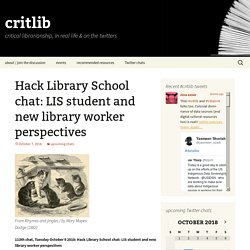

On information privilege. – info-mational. The concept of information privilege situates information literacy in a sociocultural context of justice and access. Information as the media and messages that underlie individual and collective awareness and knowledge building; privilege as the advantages, opportunities, rights, and affordances granted by status and positionality via class, race, gender, culture, sexuality, occupation, institutional affiliation, and political perspective. Librarysoul. Beyond the Collection Diversity Audit: Inclusion is More Than a Book, Why we should be auditing all of our library services for inclusion and best practices.
When I first began doing collection diversity audits, I had no idea that was what they were called.
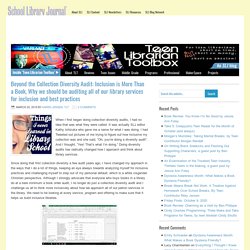
It was actually SLJ editor Kathy Ishizuka who gave me a name for what I was doing. I had Tweeted out pictures of me trying to figure out how inclusive my collection was and she said, “Oh, you’re doing a diversity audit”. And I thought, “Yes! 13. Other Information Sources – jonasfransson.com. (This is originally a chapter from the book Efficient information searching on the web.)
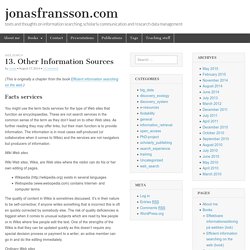
Facts services You might use the term facts services for the type of Web sites that function as encyclopaedias. These are not search services in the common sense of the term as they don’t lead on to other Web sites. As further reading they may offer links, but their main function is to provide information. Docs vous permet de créer et de modifier des documents en ligne gratuitement. Apenas uma conta.
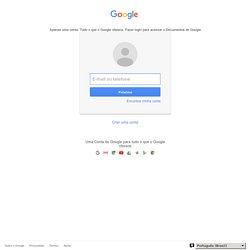
Tudo o que o Google oferece. School Library Journal. Four bold strategies to elevate your school library. School Library Journal. Youth Data Literacy – Youth Data Literacy. Awful Library Books - Hoarding is not collection development. The Windows and Mirrors of Your Child's Bookshelf. Mirrors, windows and sliding doors. Windows and Mirrors: Why We Need Diverse Books. By Chad Everett, guest blogger I was an undergraduate student the first time it happened.
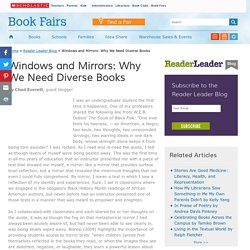
One of my professors shared the following line from W.E.B. Dubois’ The Souls of Black Folk: “One ever feels his twoness, -- an American, a Negro; two souls, two thoughts, two unreconciled strivings; two warring ideals in one dark body, whose strength alone keeps it from being torn asunder.” Data Is Beautiful. RutgersEmergingLiteracies. Annual Media Literacy Week in the United States. The Unintelligent Design of SureFire Intelligence. An IMLS-Funded Project of the University of Michigan School of Information and University Library. Civic Online Reasoning. We are in the midst of an information revolution in which we increasingly learn about the world from screens instead of print.
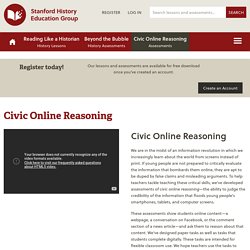
If young people are not prepared to critically evaluate the information that bombards them online, they are apt to be duped by false claims and misleading arguments. To help teachers tackle teaching these critical skills, we’ve developed assessments of civic online reasoning—the ability to judge the credibility of the information that floods young people’s smartphones, tablets, and computer screens.
These assessments show students online content—a webpage, a conversation on Facebook, or the comment section of a news article—and ask them to reason about that content. We’ve designed paper tasks as well as tasks that students complete digitally. These tasks are intended for flexible classroom use. Mind Over Media - New Resource for Teaching Propaganda and Media Literacy. This is a guest post from writer and researcher Beth Holland (@brholland).
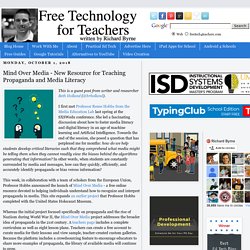
I first met Professor Renee Hobbs from the Media Education Lab last spring at the SXSWedu conference. She led a fascinating discussion about how to foster media literacy and digital literacy in an age of machine learning and Artificial Intelligence. Towards the end of the session, she posed a question that has perplexed me for months: how do we help students develop critical literacies such that they comprehend what media might be telling them when they cannot readily view the biases behind the algorithms generating that information? In other words, when students are constantly surrounded by media and messages, how can they quickly, efficiently, and accurately identify propaganda or bias versus information?
Whereas the initial project focused specifically on propaganda and the rise of Naziism during World War II, the Mind Over Media project addresses the broader idea of propaganda in the 21st century. Web Evaluation: Does This Website Smell Funny to You? Super Bowl Ad Analysis Worksheet - Media Literacy Clearinghouse. Super Bowl Ad Analysis Worksheet created by Frank W Baker, Copyright 2018 [permission is granted to duplicate for educational purposes] Download as one page PDF here; See also “Using Super Bowl Ads In The Classroom” See a complete list of “Who’s Buying Ad Time” here.Be specific: who is this ad most likely to appeal to?
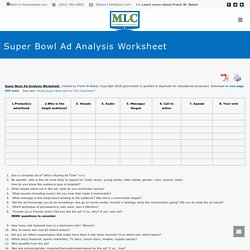
(kids, teens; young adults, older adults; gender: men, women, both) how do you know this audience type is targeted? 5 Good Places to Find Public Domain Video Clips. There are plenty of places to find public domain images online. But finding public domain video clips isn't quite as easy as finding public domain images. Part of the reason for that is the cost associated with hosting videos. Should you find yourself or your students in need of public domain video clips to mix into video projects, try one of these five places that host public domain videos that you can download. Last month the Library of Congress launched the National Screening Room. The National Screening Room currently offers about 300 videos.
Flickr is known for hosting millions of images, but it also hosts lots of videos.
Create a volunteer program. 100 Things Poster. Student VolunteersIdeas. John Hattie's 10th Mindframe for Learning - Peter DeWitt's Finding Common Ground - Education Week. Genrefication…Ready, Set, WAIT! Where Do I Start?! – This Library Life. After learning about genrefication and the effects it can have on student ease and circulation numbers, I was on board.
Our circulation numbers have declined slightly each year the last 2 years and I wanted to make a change. Another reason this project was so enticing is because when a student would state that they enjoyed a particular genre it required a lot of thinking/research to locate a book of their liking; now we can take them to the section and help them browse that single area. I looked into Tiffany Whitehead’s genrefication plan a little deeper and started to form a plan of my own. I did not want a whole lot of genres, because I didn’t want to over complicate the system for our students. I decided 9 color coded genres was perfect; Action Adventure-red, Science Fiction/Fantasy-Purple, Realistic Fiction-Blue, Historical Fiction-Grey, Romance- Pink, Inspirational-Yellow, Mystery/Suspense-Burgundy, Sports- Green, and Classics-White. School Library Connection Home.
Hack Library School chat: LIS student and new library worker perspectives. 113th chat, Tuesday October 9 2018: Hack Library School chat: LIS student and new library worker perspectives 6 pm Pacific / 7 pm Mountain / 8 pm Central / 9 pm Eastern moderated by @DatasBrain & @LibrarianLauraJ in collaboration with Hack Library School suggested resources: McLaughlin, Zoë.
